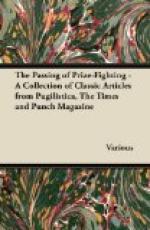Without action or wit, what then renders the comedy endurable? It is this: all the parts are individualities—they speak, each and every of them, exactly such words, by which they give utterance to such thoughts, as are characteristic of him or herself, each after his kind. In this respect the “Court and City” presents as pure a delineation of manners as a play without incident can do—a truer one, perhaps, than if it were studded with brilliancies; for in private life neither the denizens of St. James’s, nor those of St. Botolph’s, were ever celebrated for the brilliancy of their wit. Nor are they at present; if we may judge from the fact of Colonel Sibthorp being the representative of the one class, and Sir Peter Laurie the oracle of the other.
This nice adaptation of the dialogue to the various characters, therefore, offers scope for good acting, and gets it. Mr. Farren, in Sir Paladin Scruple, affords what tradition and social history assure us is a perfect portraiture of an old gentleman of the last century;—more than that, of a singular, peculiar old gentleman. And yet this excellent artist, in portraying the peculiarities of the individual, still preserves the general features of the class. The part itself is the most difficult in nature to make tolerable on the stage, its leading characteristic being wordiness. Sir Paladin, a gentleman (in the ultra strict sense of that term) seventy years of age, is desirous of the character of un homme de bonnes fortunes. Cold, precise, and pedantic, he tells the objects—not of his flame—but of his declarations, that he is consumed with passion, dying of despair, devoured with love—talking at the same time in parenthetical apologies, nicely-balanced antitheses, and behaving himself with the most frigid formality. His bow (that old-fashioned and elaborate manual exercise called “making a leg”) is in itself an epitome of the manners and customs of the ancients.
Madame Vestris and Mr. C. Matthews played Lady and Lord Whiffle—two also exceedingly difficult characters, but by these performers most delicately handled. They are a very young, inexperienced (almost childish), and quarrelsome couple. Frivolity so extreme as they were required to represent demands the utmost nicety of colouring to rescue it from silliness and inanity. But the actors kept their portraits well up to a pleasing standard, and made them both quite spirituels (more French—that Morning Post will be the ruin of us), as well as in a high degree natural.
All the rest of the players, being always and altogether actors, within the most literal meaning of the word, were exactly the same in this comedy as they are in any other. Mr. Diddear had in Lord Dangerfield one of those parts which is generally confided to gentlemen who deliver the dialogue with one hand thrust into the bosom of the vest—the other remaining at liberty, with which to saw the air, or to shake




